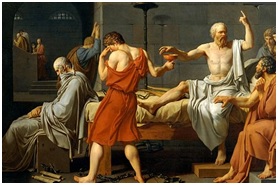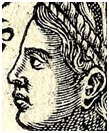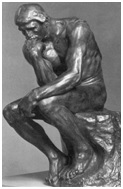|
 |
|
 |
|
|
||
The Trial and Death of Socrates - Learning and Ethics
The Trial and Death of Socrates (399 BC)
Famous for...
1. The trial of Socrates in Athens The Greek philosopher, Socrates, pictured right, (470-399 BC) was charged with;
2. His defence speech This was a heroic defence of truth and wisdom (later reported by his student, Plato ,pictured right).
3. His conviction and death He was sentenced to death by the court (500 male jurors without a judge). 280 found him guilty. Socrates died drinking hemlock (pictured below is Jacques-Louis David's 1787 painting, The Death of Socrates) .
Key people
The famous Greek philosopher
Crito Socrates' best friend. Xanthippe Socrates' wife (pictured right in a 1553 drawing).
Reasons for his trial
1. He annoyed important people His defence speech describes his role as a “gadfly”, cross-examining people so that they:
He believed that everyone should humbly accept their ignorance, but this annoyed important people who thought they were already wise! Three people, in particular hated him and led his prosecution:
2. His politics The democratic government of Athens wanted to convict Socrates, because of his friendship with Critias. Critias was a leading member of the Thirty Tyrants, a murderous military dictatorship that ruled Athens in 404 BC.
3. His relationships with young men The charge of corrupting young men partly resulted from his flirting with them, particularly Alcibiades (pictured right), whom he befriended in the Athenian army. Plato says they:
Even if Socrates had been interested in men, this wouldn’t have been a major reason for his trial - most Athenian men had affairs with teenage boys.
Lessons for learning and ethics
1. The majority isn’t always right The English philosopher, John Stuart Mill’s (pictured right) belief in the “tyranny of the majority” is confirmed when Socrates is unjustly sentenced to death by the jury. Wisdom isn’t always what the majority says it is.
2. Truth and wisdom matter more than popularity Socrates sacrificed his life for supporting his unpopular philosophy of challenging people to find truth and wisdom through critical self-examination. “No evil or ignorant person ever strives for wisdom”, he said.
3. Arrogance angers People were annoyed by Socrates because they were arrogant enough to think they:
Socrates’ tactless air of superiority also didn’t help him. As his trial was political, Athenian law gave him the right to choose his own punishment. But he angered the jury by pompously suggesting a fine that was far too small.
4. Think for yourself Socrates’ advice was:
Self-discovered virtue is much more important than anything else, he said.
5. Decisions are sometimes difficult Socrates had to choose between his:
Crito, his best friend, was so concerned about Socrates' family that he bribed the prison guards to give him the chance to escape. Just before his death, Xanthippe’s cries were so hysterical that Socrates asked that she be taken away from him.
6. Don’t be afraid of death Socrates was willing to die because he:
He died calmly and courageously comforted by his:
7. Life is difficult Socrates saw death as a release from life’s problems. His last words to Crito were: “We owe a cock to Asclepius [the Greek god of medicine]. Pay it and do not forget”. In other words, he thanks Asclepius for the medicine (the hemlock) that will:
8. Character before cash Socrates said in his defence speech that virtue is:
Such virtue is based on:
Key quotes (from Socrates’ defence speech)
Virtue springs not from possessions, but from virtue springs possessions and all other human blessings, whether for the individual or for society.
Hard it is not to avoid death, it is far harder to avoid wrongdoing.
No evil can happen to a good man, either in life or after death.
Wherever a man has taken a position that he believes to be best...there he must I think remain and face danger, without a thought for death or anything else, rather than disgrace.
It is the most blameworthy ignorance to believe that one knows what one does not know.
Best book Emily Wilson, The Death of Socrates (2007) |
|
|
||
|
|
||
| Copyright © wisdomtowin.com 2025 All Rights Reserved | ||
|














